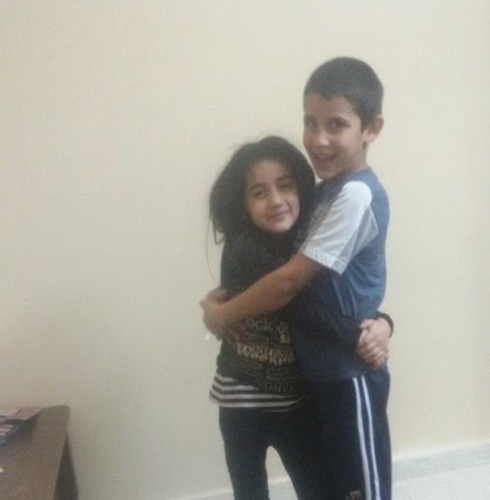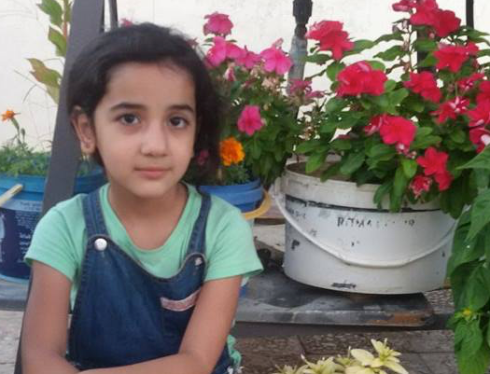Shortly before graduating from college, my dear friend Rania from Jayyous (a major character in my book) married Sharif, a poor but kind man who lost his parents when he was young and never finished high school. He was incredibly supportive of Rania’s education, and they had a beautiful baby boy named Karam in 2007.
Two years later she was pregnant with a little girl, and Sharif secured a permit to work in Israel so he could finish building their house and support his growing family.
Then… disaster struck. Before her husband had a chance to use his permit, he was brutally arrested in the middle of the night by armed Israeli soldiers who beat him in front of his pregnant wife and child and put him behind bars for a year on bogus charges.
When her husband was finally released, he was a changed man, in bad health and bad spirits with no hope of ever getting a permit to work in Israel again. The only jobs he could get were tough physical labor that paid little (and prices is Palestine are hideously inflated due to the occupation).
In 2010, Rania took the initiative and found meaningful work with the Syndicate of Psychological Social Workers, an organization that sponsors activities, classes, and counseling sessions to improve the psychological health of the community. It’s a desperately needed service in a town suffering so badly from the occupation (violence, vicious arrests, land expropriation and unemployment) and other stresses (the usual societal problems like spousal abuse, disabilities, and mental illness).
Unfortunately, it’s not a paid position. The Syndicate has been trying to get funding for years, and Salam Fayyad visited more than once and personally promised funding. But for various reasons — such as Israel’s withholding of Palestinian tax funds to try to prevent the formation of a Palestinian unity government — it has never materialized. Their office doesn’t even have working phones. We have tried many times to find outside funding, but most covers only projects and materials, not salaries. And due to exigencies in Gaza, Syria, and elsewhere, aid funds are scarcer than ever.
So, for the past several years, I’ve been raising funds to send Rania $300 per month as a nominal salary so that she can continue the work and keep raising her beautiful kids, Karam and Lusan.


When I visited Palestine in 2011, Rania invited me to see the work she does on a daily basis. It was a whirlwind tour. First we went to the Syndicate office and talked with other volunteers. One was taking a group of women through lessons that would count toward their university training in counseling. One of the male volunteers was a music teacher. Another was a policeman, most of whose family is in Israeli prison. One of his sons was unable to finish high school because the Israelis took him when he was 16.
They all had the disarming, earnest friendliness I’m used to in Palestine, the same direct and matter-of-fact way of talking about their hardships, the same undying hope that telling their story just one more time will somehow make a difference. And they all spoke of Rania as if she’s indispensable.
Next we visited a home for the mentally disabled. Most of the people there had Down syndrome. Many of them recognized Rania, and their faces lit up when they saw her. A teacher showed us the different classrooms, from the one was for people who could barely function at all, who basically just played or danced all day, to the most advanced, where students could learn to read and write and perform other basic skills.
Finally we went to a UN school for refugee children, where Rania and several other women organized an after school program for girls through the local YMCA. About a hundred high-spirited first-graders showed up, all of them girls, and we set up games of tug-of-war, sack races, hop-scotch, hula hoops, and best of all, the game where everyone grabs the edge of a parachute cloth and jumbles it around with balls on top so that the balls jump around. Everyone was laughing the whole time we did it.
Rania whispered to me, “When the girls are doing this, they forget all their stress!”

Afterwards we handed out juice boxes and cakes and did face-painting and drawing on a giant piece of butcher paper. The girls were engaged the whole time, their eyes shining, supporting each other through every challenge. Without these women, and the smattering of funding from the YMCA for the supplies, these girls would simply be trudging home to crowded cinderblock alleys and small rooms that may or may not have electricity.
It was incredibly humbling to see so many volunteers, who had difficult and busy lives of their own, spending their time helping others instead of throwing up their hands or ignoring their even-less-fortunate neighbors.
Since then Rania has continued and intensified her social work in Tulkarem. A recent project involved organizing a summer camp for children, especially kids from refugee camps. Activities included counseling, art, drama, playing, swimming, and education about human rights and international law.
One ten-year-old boy came up to her after a workshop on human rights and said angrily, “You give us exercises and let us play, and you say nice words about international law, but we still don’t have human rights. You should be honest about this.”
Kids aren’t stupid. They know what they see.


She was taken aback, but she said, “I understand, I feel with your anger. God willing, one day we will have human rights.”
It’s a terrible thing to have to say to a ten-year-old. But it’s good to give them forums in which they can learn what they’re missing and vent about their pent-up feelings, so that hopefully one day they will be more effective in the struggle to implement their rights.
The summer activities also had a twist: The mothers of the children were invited to some of the activities, including picnics and a day in an amusement park. Rania said they were amazed, because it was the first time they had been included in something like that. They were also given free counseling sessions, and many said it was the first time anyone had allowed them to express their feelings and cry.
Mothers in Palestine have to keep the family together more than anyone. The society would quickly collapse without their strength. But there’s little space for them to break down or show emotion. Day to day they feel they have to remain composed, even when their heart is breaking.
Rania said she would do what she could to continue providing these services to the people who need them. And I’m glad to do what I can as well.
100% of the money you give goes to Rania. I pay for all rewards offered during fundraisers and all Western Union fees. So what you give is what she gets, and she in turn gives to the hundreds of people she helps with her work. It’s an investment guaranteed to grow many times over. You can’t say that about many investments these days.
My Paypal email is pamolson02@yahoo.com, or you can email me for details about how to send a check. If you’d prefer to send money directly to her via Western Union, I can send instructions on how to do it — it’s very easy.
Fundraising and donating aren’t nearly as hard as raising amazing children while trying to be a rock for a society under brutal, strangling occupation. But the one makes the other possible, and it’s an honor to be a small part of it.
Even $5 or $10 makes a huge difference, believe me.
Thank you.
Ramadan Kareem!
Love and light,
Pamela
















Leave a comment
Comments feed for this article